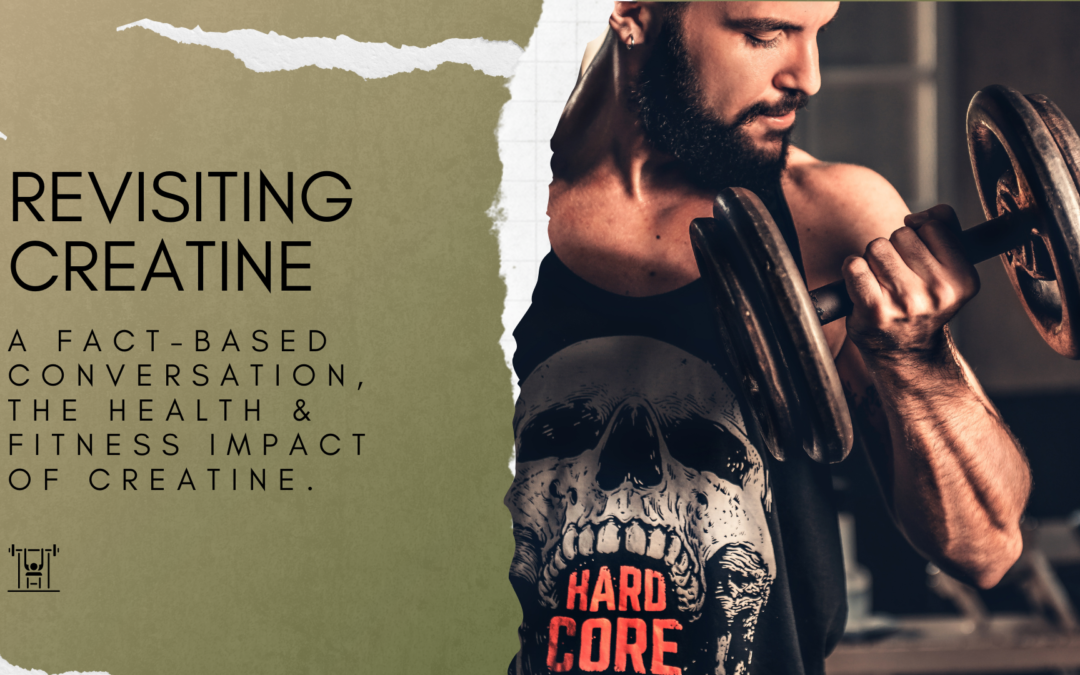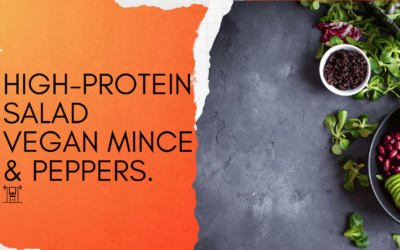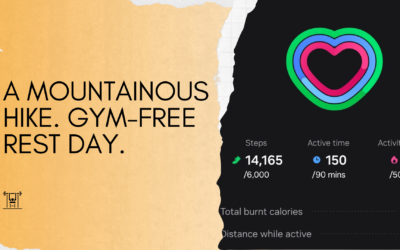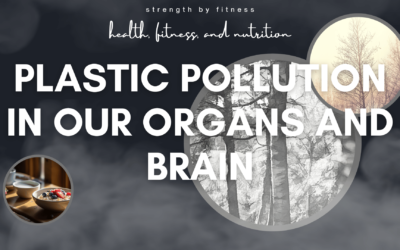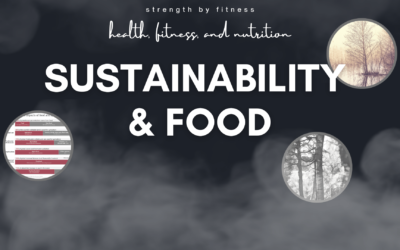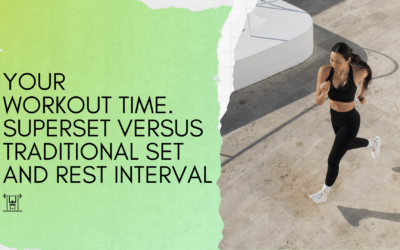
Strength By Fitness
Revisiting Creatine. A fact-based conversation.
The Health & Fitness Impact Of Creatine..
Another fact-based article from Strength by Fitness.
I have previously written about Creatine on a couple of occasions here on Medium, and our Strength by Fitness website, as well as for other companies and outlets during the last decade as a coach, and personal trainer.
What can I say, Creatine works, it is safe, it’s affordable, it is well researched, and most remarkably, as the years, and studies pile up, the real-life, fact-based benefits of Creatine keep revealing new layers.
As such, it is time to revisit Creatine once more.
But why is that? Well, it just so happens that recent studies, in the last couple of years have continued to unravel far more health benefits than previously thought.
Most people know perfectly well that strength, sports, and physique athletes, and regular gym goers have a fondness for using Creatine pretty much all year round.
Best of all is that this preference for supplementing with Creatine is for good reasons, and not based on good marketing, and vague claims that do not measure up in real life, and studies
The positive benefits of Creatine supplementation are well-established
The positive benefits of Creatine supplementation have been well-established for several decades by now.
At the core foundation of the many reasons why you should supplement with a daily all-year-round intake of 3 to ( roughly ) 5 grams of Creatine Monohydrate is the simple fact that a higher Creatine intake than what we can get from meat-heavy diets boosts strength, recovery, power, and intense work performance in many high intense sports and situations.
Add to this that daily Creatine supplementation also boosts lean muscle mass progression pace by roughly 33% and that it is perfectly safe, and well, you are left with a well-established, well-reasoned foundation for why athletes and regular gymgoers consume Creatine supplementation.
The TLDR:
But, the TLDR of this article is this. Everyone should probably supplement with Creatine Monohydrate no matter if fitness isn’t a main pillar of interest in their life. Why is that?
Because Creatine has such a positive impact on a wide metric of health outcomes, no matter our age span. From heart to brain, daily energy, mood, brain trauma, Alzheimer and our memory.
One short example from July 2024.
In this study on elderly men between the ages of 55 to 80 received a placebo, or Creatine. The outcome in the three groups, placebo, Creatine, or control was as follows.
Cardio-ankle vascular only improved in the creatine group (8.7 ± 0.5 to 8.2 ± 0.5, p = 0.03). The same thing could be seen for the upstroke time where the creatine group had a nonsignificant reduction and the other two groups showed no change at all, 178.9 ± 26.5 ms to 158.4 ± 28.6 ms, p = 0.07.
Finally, the same thing happened with systolic blood pressures, the daily creatine intake group showed nonsignificant improvement, 144.0 ± 12.7 mmHg to 136.1 ± 13.4 mmHg, p = 0.08, while the other two groups displayed no change at all.
The conclusion was this.
In older adults, acute creatine supplementation can positively affect vascular parameters of arterial stiffness and atherosclerosis. Creatine supplementation has the potential to serve as a potent adjuvant in the management of CVD for older adults.
There are some caveats to this study in my opinion, mainly that it was way too short at only 7 days. However, it is one of many recent studies that all display a positive impact on daily Creatine supplementation in older age groups on health metrics and outcomes that have very little to do with fitness.
So, as the rest of this article will conclude, you should strongly consider adding Creatine to your life even if you have no interest in strength and other intense sports and fitness habits.
The applications of Creatine Monohydrate are well understood and widespread.
The fact that it also improves the pace of recovery, and explosive energy production, benefits not just strength training, and progression but highly explosive sprint interval-demanding sports like wrestling, ice hockey, martial arts, and soccer too.
So the applications of Creatine Monohydrate are very widespread outside of resistance training, and pure strength sports.
However, as the years kept on going scientific studies started to connect a higher Creatine intake to cognitive benefits, heart health, and better health outcomes in general.
Even the more hard-defined mental health qualities of anxiety, depression, or people’s daily mood, in general, seem to be positively affected by the amount of additional Creatine that is continuously consumed.
I am purposefully saying additional consumption because we all produce a low amount of Creatine in our bodies, but the natural levels our bodies produce are too low to provide any of the benefits we see from additional Creatine supplementation. As is the Creatine you can get from even the most meat-heavy diets.
Or as this one study concluded, and I am paraphrasing it right below.
Paraphrasing this study because this was a good paragraph. It became a paraphrase for our article since I had to clarify that it is not possible to fully saturate Creatine levels and thus benefit from completely saturated Creatine levels without Creatine supplementation, even for a meat-heavy omnivore diet.Creatine is a major component of energy metabolism that is abundant in human skeletal muscle, brain, and heart. People get Creatine in two ways, we synthesize it internally in the body on a daily basis, and we get it from an animal-heavy omnivorous diet.
Creatine is required for normal growth, development, and sustained health across the entirety of our human health span.
What is fairly new scientifically speaking is the knowledge that the quantity of creatine we naturally synthesize & get from meat-heavy diets is not a sufficient amount of Creatine to meet optimal human health & fitness needs.
In order to get the full benefits of perpetually saturated Creatine levels we have to obtain additional creatine via daily supplements.At least if the desire is to unlock maximized health & fitness capacity in body, and mind, recovery, strength, and hypertrophy progression.
https://www.sciencedirect.com/science/article/pii/S2161831322005269?s=09

Better health outcomes, lowered risk for dementia, anxiety, depression, and Alzheimers. better cognitive performance and mood even as we age.
I have touched upon these benefits before, but with more studies being published I really want to hammer down just how beneficial Creatine is for people’s health and well-being over time, even if you might not be interested in strength training or sports performance in any way whatsoever.
This is a crucial point to drive home, because a lot of people, most perhaps, think of Creatine as a sports performance supplement only, but it is much more than just for sports and gym.
Creatine really should be thought of as a highly beneficial macronutrient if you so wish. Unlike protein and certain fats, we do not need to consume additional levels of Creatine. You will survive without getting any Creatine from your food.
But, just as the situation is with high-quality Carbohydrates and high-protein food plans, our bodies, our health, well-being, and our fitness progression greatly benefit from the inclusion of additional Creatine in our dietary choices.
In the same way that a high-protein food plan boosts hypertrophy, health outcomes, strength, and recovery when compared to a low-protein intake such as the RDA, a daily intake of 5 grams of Creatine provides a never-ending boost for many biological metrics in the human body.
the benefits from a daily intake of creatine monohydrate is no different than the positive impact of high-protein foods across our entire health span.
Who would not want to enjoy all of the above if it was affordable and safe to achieve that positive health outcome? Probably not a single human being would be the answer.
And this is exactly what an affordable daily, all-year-round intake of Creatine provides us with.
So let us take a look at a few of the benefits that transgress our muscles and gift us with better cognitive health.
At its core, an additional creatine intake powers us up by acting as an energy-producing nutrient, allowing our own cells and neurological functions to perform at a higher, and better level than what they can do when the only Creatine they can tap into is the small amount our bodies produce on their own as well as the insufficient Creatine that meat provides omnivores with.
This is why athletes perform slightly better when consuming Creatine on a daily, all-year-round basis. Strength, explosiveness, lean muscle mass, energy, recovery, and physical power output all benefit from this slight increase in energy levels being available in our bodies.
But it does not stop there, our mitochondria, and cognitive office in our brain also love Creatine.
So for now, let us leave the “gym” behind and take a look at what happens in the brain department of our human bodies.
A daily intake of roughly 5 grams of Creatine per day is what is most commonly prescribed because this represents a level that provides several fact-based benefits, and few studies can showcase additional benefits from a larger Creatine intake.
Outside of the “gym stuff” Creatine boosts our cognitive performance, mood, and brain health by supporting better brain cell growth. This also includes better neurological communication.
In addition to this, Creatine also increases the amount of oxygen that is consumed in the human brain, and this is another good thing.
Now, I mentioned that most studies have landed at roughly 5 grams being the recommended level of intake. But, some of the cognitive benefits, especially for elderly people might require a slightly larger Creatine intake.
Which to be honest would not be very surprising. After all, Creatine is just another nutrient. And as we age, our bodies get slightly worse when it comes down to nutritional absorption to name one thing.
Protein needs increase in the second half of our life, as do the amount of b12 we need to consume, all because it becomes increasingly hard for our bodies to break down the nutrients we eat and to absorb them in a meaningful way.
So, why should Creatine be any different?
But having said that, as of today, when I write this article in 2024 we can’t say for certain how much Creatine you need to consume as a minimum to tap into the cognitive benefits. It might be that 5 grams is sufficient, or that you need 10 grams, 8, or 16 grams. More studies will in due time land at a proper consumption level including any age-related dependencies.
Daily Creatine consumption equals better health outcomes for the human brain.
From depression to brain cancer these unpleasant health outcomes all involve impaired energy metabolism in some form and just like with our muscles, our brain is highly concentrated with creatine.
It is actually one of the most abundant compounds in the human brain.
More importantly, Creatine levels in humans are inversely related to depression levels. Today we can even go as far as to point out that a human diet that lacks additional creatine correlates with a significant increase in depression risk and anxiety.
How much you say?
Well, there is roughly a twofold increase in the likelihood of developing depression if you are not getting enough Creatine from your food, and guess what, not even big-time meat-eating omnivores get as much Creatine from their food as was previously assumed.
Ergo, even carnivores that shower in blood-drenched meat consumption, all day long would benefit from a daily, 3 to 5g Creatine supplementation.
Yes, I am erring on the side of what we know works as far as most benefits go and that is roughly 5 grams of Creatine supplementation per day, which will unlock all the gym & fitness benefits for most humans.
So until science clearly tells me that you need 8, 10, or 18 grams of Creatine per day to also unlock all of the cognitive benefits I´ll stick to the 5 grams per day recommendation.
What specifically will Creatine do for our grey matter HQ?
Supplementing with a daily dose of 3 to 5 grams of Creatine Monohydrate per day will boost not just health outcomes but memory, logic, math, mood & the perceived amount of daily energy that is available for both physical and cognitive tasks.
Creatine boosts ATP production at its most basic premise, but it also boosts the amount of available dopamine. Which in turn correlates to important metrics such as motivation, daily energy, our cognitive & mental clarity.
This is where Creatine supplementation becomes really interesting, because, as you might be aware, modern-day life frequently impairs our well-being, and all these dopamine sensible metrics from nothing more than the stress of working too much, sleeping too little, hustling about to pay the bills, rent, food and so forth, lackluster relationship, lacking sex life, horrible bosses et cetera.
Combine all the above with poor nutritional intake, too much alcohol, too little exercise, and too much sedentary lifestyles in general.
Well, no wonder humanity is in poor shape.
Chronic stress takes a huge toll on human health, and all these factors combined make people far more likely to just sit around, doing nothing and wallowing in their sedentary lifestyle.
Being lethargic, unhealthy, and unhappy. Now Creatine won’t solve any of this on its own. But, eating healthy, high-protein foods helps with many metrics, as do regular exercise, good enough quality sleep does the same, and meeting all of our nutritional needs also helps human health & well-being, in body, and mind.
This brings us to daily Creatine supplementation because that adds one more brick loaded with positive synergy to all of the above.
Better health outcomes, better body composition, recovery, strength, daily energy, mood, lean muscle mass, raw physical work capacity, cognitive function, and health.
Boom.
This is not all that Creatine can do for us outside of the gym.
In study after study, we see that additional Creatine supplementation even helps brain trauma patients, and it not only helps the body recover faster and better from concussions. It actually protects the brain from getting damaged in the first place.
This very much mimics the same way that Creatine supplementation lowers the risk of running into some heart issues.
Body & mind people. Creatine correlates to a much healthier and capable you.
Traumatic brain trauma patients end up with much better recovery when Creatine is supplemented.
However, the brain-centered benefits also extend to drastically lower risk of developing Alzheimer’s and other cognitive health issues.
Just how it is that Creatine displays such a profoundly positive impact on such a wide range of cognitive & physical functions and metrics is not entirely understood.
But outside of the added energy capacity in cells, protective attributes, water retention, and higher recovery & progression rate, we know that Creatine supplementation has a positive impact on proteins such as Tau and Beta Amyloid proteins in the brain by reducing their accumulation.
ATP & the human body.
ATP is another crucial energy component in human biology and our ability to exert ourselves like short-lived superheroes. It´s the super fuel for body & mind.
But ATP isn’t just important for muscular performance levels. Cellular levels of ATP are also a critical factor in the actual survival of our cells, and reduced brain ATP is associated with altered processing and the cerebral accumulation of Aβ plaques.
In the end, all these things put together make the fact-based case that Creatine should be supplemented by pretty much every human being, on a daily basis, all year round.
In that regard, its benefit and role as a “daily life essential” should be thought more of as the essential importance of protein than just another “sports performance supplement”.
Yes I get it, we get Creatine from our food, and our bodies also produce a small amount of daily Creatine, so it is tempting for plant-based people and carnivores alike to think that they get enough Creatine, but this is not the case.
The simple act of adding 3 to 5 grams of Creatine per day, all year round will boost your physical and cognitive capacity and health across your entire lifespan in a way that you will never achieve no matter how much meat you eat on a daily basis.
But before we continue, let us also take a quick detour back in time and take a look at actual hypertrophy numbers, because Creatine boosts the progression pace of strength & hypertrophy in quite a substantial way.
Actual hypertrophy boost for Strength Training & Creatine.
Dropping this 2023 study right here for your convenience.
https://www.mdpi.com/2072-6643/15/9/2116?s=09
This larger meta-analysis looked at the actual effect that Creatine provides for strength training individuals on their lean muscle mass progression, also known as hypertrophy.
Most other times it is usually the total lean mass change that gets measured. Which also includes water, this study however looked at lean muscle mass only so numbers are lower than what you will actually experience in real life).
The TLDR paints a pretty picture since we can clearly see that creatine helps healthy humans build lean muscle mass roughly 33% faster than you would have done without supplementing with Creatine.
For us steroid-free humans that makes Creatine a very nice, low-cost, effective, and health-promoting supplement. If the number sounds small to you, you would do well to remember, that actual fitness progression slows down tremendously once you have been training for more than a few years.
So a 33% boost in progression pace, on average is a big, and positive aid.
One more thing to take note of here, this is on top of the health, and fitness-improving changes that going to the gym already provides, further, it also happened without the impact of a high-protein food plan.
So you have to think of the effect of Creatine as an addition to what regular fitness and a healthy high-protein food plan already do for you.
Creatine supplementation should be approached the same way as high-protein food plans. Because the benefit might decrease with old age, but it is still there for both Creatine supplementation & high-protein food plans.
While we can not say for sure that a 75-year-old can get away with only consuming 5 grams of Creatine Monohydrate per day and still reap all of the usual benefits of Creatine they used to get at age 30 and 50, we have enough studies that clearly show us the many benefits that roughly 5 grams of Creatine supplementation will result in for almost all humans.
So roughly 5 grams of Creatine per day should be the default for almost everyone. All while we can keep in mind that older people might need more Creatine.
So, if studies, later on start showing us a clear boost to those Creatine related benefits in body and mind for people in the later half of life from higher levels of Creatine supplementation, then it’s time to adjust the amount of daily Creatine you take.
I am saying this, being fully aware of a couple of studies from the past year that did display a slightly lower fitness benefit from 5 grams of Creatine for the elderly.
But the fitness benefits were still there, they where just slightly lower compared to a 30-year-old.
Flawed conclusions.
Unlike the flawed conclusion that those scientists made I see that as a fact-based reason to take Creatine for all of life. As I have already mentioned in this article, even protein absorption and turnover become worse late in life, together with our hypertrophic response to training & higher protein intake, but that only makes high-protein consumption and resistance training even more important for the elderly.
Creatine should, in other words, be approached with the same generally accepted fact-based point of view.
So when we consider not just its vast array of benefits, but its safety & small cost too, a 14 to 20US$ Creatine container will last you for almost 90 days, depending on which brand you buy, of course.
But there are no good reasons for why you should not take Creatine all year round or why you should buy a can of Creatine Monohydrate that is twice as expensive, all non-contaminated Creatine Monohydrate products from real brands are the same.
Nope, hair loss is not a thing, and Creatine, like protein, does not harm your kidneys. The one curious downside might be that a very small amount of people report sleeping less when taking Creatine. or a sensation of slight tummy cramps.
On the other hand, it is a well-known scientific fact that Creatine reduces the negative health impact of insufficient sleep.
So not even getting slightly less shut-eye time is a hard-coded no-go when it comes time to decide if you should supplement with 3 to 5 grams of Creatine monohydrate or not. Not sure how much Creatine you should consume?
Why not base your Creatine intake on your bodyweight in kilo in that case.
Just take your bodyweight and multiply it with 0.05 or 0.07 as they did in the study you can find right below. As you can see, this simple study adds further evidence of Creatines beneficial impact on human health, body composition, and muscle mass since they compared resistance training on its own and resistance training + a daily 7gram intake.
The results?
In this study, 7 g ( or 0.07 g/kg of body weight ) of Creatine per day, managed to increase lean mass by an additional 1 kg and reduce fat mass by 0.7 kg more than what was achieved via resistance training on its own.
Anyway, hit up our podcast on Spotify or YouTube, or deep-dive into the referenced studies behind this article by Coach Mike from Strength By Fitness, you can also read our paywalled articles on Medium if you prefer that option.
Cited studies
Creatine for body, mind, health, aging fitness, cardiact and cognitive health.
1. https://cdn.nutrition.org/article/S2475-2991(23)26595-6/fulltext
2. https://www.scopus.com/record/display.uri?eid=2-s2.0-85079605640&origin=inward&txGid=b6093d7aa06b7092dfa6efcc9588e4b1
3. https://www.frontiersin.org/journals/nutrition/articles/10.3389/fnut.2024.1424972/full?s=09
4. https://academic.oup.com/nutritionreviews/article-abstract/81/11/1497/6987897?login=false&s=09
5. https://pubmed.ncbi.nlm.nih.gov/35984306/?s=09
6. Creatine in Health and Disease – PubMed (nih.gov)
7. Effects of acute creatine supplementation on cardiac and vascular responses in older men; a randomized controlled trial – ScienceDirect
strength by fitness
podcasts
recent articles
Plant-Based High-Protein Recipe: Pepper, Mince Salad.
This is one of Strength By Fitness plant-based high-protein meals. A tasty high-protein salad with peppers and vegan mince. 70 grams of protein, from 3 different protein sources, nutritiously rich and satiating.
Recipe Strength By Fitness.
Our mountainous hike on our gym-free Saturday.
Saturday is one of our weekly gym-free recovery days. This means that we prioritize ‘us’ time, chilling, relaxing, recovering, eating healthy high-protein foods supplanted with plenty of whole plant-based foods, and doing nonexhaustive activities that are done for adventure, fun, family, relationship, calm, rejuvenating and quality of life time.
Our world suffers both obesity & nutritional deficits.
Around the world, billions of people eat too much food while at the same time not getting enough nutrients. But how bad is the situation really?.
Let us look at some nutrients and how many are estimated to be deficient globally right now.
The relentless onslaught of plastic pollution.
Globally speaking, this disregard for cause & consequences becomes even more apparent in the way far too many still do not acknowledge the importance of a healthy planetary home and the fact-based suffering and harm we are causing both ourselves and our planet by our refusal to live in a sustainable way.
The blood-brain barrier and plastic pollution.
So, following this short introduction I have drummed up, we have finally arrived at the core of my article. Man-made plastic pollution and the way it encapsulates everything in our earthly home by now.
Even our brain.
Nutritional Coaching + Sustainability. This is why they need to go hand in hand.
Strength By Fitness Sustainability & Nutritional Coaching Needs to Walk Hand in Hand. This is a 5-minute-read on Why that is. Welcome to another fact-based article from Strength by Fitness. I have for the past 15 or so years of talking about, writing, and coaching...
A fact-based conversation on the subject of supersets versus a traditional set approach.
The agonist-antagonist super set is capable of cutting your workout time in half without falling too far behind the strength progression of a traditional workout plan. But, you can also make use of the way I do, which allows you to cram more high quality workout volume and sessions per week into the same gym time envelope of your regular workouts, without compromising on progression at all.
We appreciate you
so stay healthy & never stop training
Contact
Private In-App Messaging is Available For All App + Coaching Clients
Adress
Coaching
Available Online on IOS & Google Play, and In-person.
